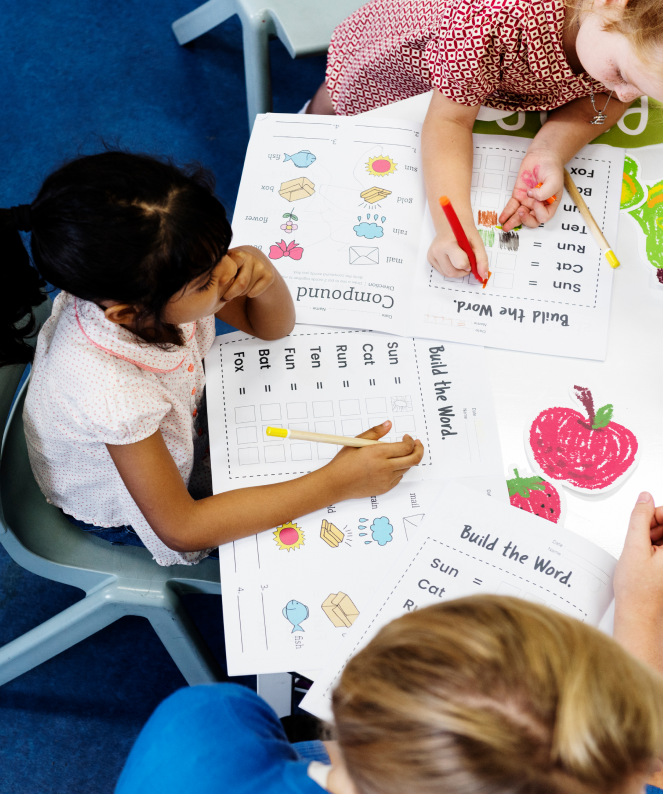Worried Your Child Is Reading Without Understanding?
Worried Your Child Is Reading Without Understanding?
Published: Monday, August 5, 2024
Reading is such an important skill for our kids to succeed in both school and life. But have you ever worried that your child might be reading without really understanding?
Places like Kumon focus on repetition. This leads to students who can read but struggle to truly understand and engage with the texts. Which means our kids may fall behind in school and life.
Let’s explore why critical thinking is more important than repetitive practice in reading and how it benefits our children in the long run.
The Downside of Repetitive Reading
Imagine your child reading the same passage over and over again without truly understanding it. This leads to:
- Lack of Understanding: Your child might read the words but not grasp the deeper meaning of the text.
- Limited Engagement: Without critical engagement, reading can become boring, causing your child to lose interest quickly.
- Poor Application: Your child may struggle to apply what they’ve read to real-world situations because they haven’t learned to think deeply about the material.
These issues can make reading a chore rather than a joy, and they don’t prepare our kids for the critical thinking required in higher education and the next grade level.
But don’t worry, there’s a better way to help our kids succeed.
Develops Critical Thinking Skills
What Happens Now:
- Repetitive Reading: Many learning methods emphasize reading the same material repeatedly without questioning it, which limits understanding.
What Should Happen Instead:
- Encouraging Questions: When students are encouraged to question, analyze, and evaluate what they read, they develop critical thinking skills. This helps them become more discerning readers who can understand and engage with the material on a deeper level.
In New Jersey, where educational standards are high, helping our children develop these skills is essential. Encouraging them to ask questions and think critically about what they read will not only improve their academic performance but also prepare them for the complex world they will face in the future.
Enhances Comprehension
What Happens Now:
- Reading for Reading’s Sake: Often, students read without truly grasping the content, just like the way your may have learned back home or at places like Kumon.
What Should Happen Instead:
- Deep Engagement: Critical thinking encourages students to engage deeply with texts. This leads to better comprehension as they understand the meaning and implications of what they read.
For example, instead of just reading a passage and memorizing it, we should encourage our kids to discuss what they’ve read.
Ask them questions like, “What do you think the author is trying to say?” or “How does this story relate to our own experiences?” This way, they are more likely to understand and remember the material.
Fosters Creativity & Imagination
What Happens Now:
- Limited Imagination: Repetitive reading does not encourage creative thinking.
What Should Happen Instead:
- Creative Thinking: When students think critically about texts, they are more likely to develop their own ideas and perspectives. This fosters creativity and imagination, benefiting them beyond academics.
We know that education is the most important. So it’s crucial for our children to develop these skills. By encouraging them to think critically and creatively about what they read, we’re helping them to become more innovative thinkers.
Improves Knowledge Application
What Happens Now:
- Disconnected Learning: Students may struggle to apply what they learn to real-life situations.
What Should Happen Instead:
- Practical Application: Critical thinking helps students see how the material they read applies to real-world scenarios. This improves their ability to use knowledge in practical ways.
For instance, when our kids read about historical events or scientific concepts, we should encourage them to think about how these ideas apply to current events or everyday life.
This not only enhances their understanding but also makes learning more relevant and exciting.
Prepares Students for College & Career
What Happens Now:
- Unprepared for Future: Repetitive reading does not equip students with the skills needed for higher education or the workplace.
What Should Happen Instead:
- College and Career Readiness: Critical thinking skills are essential for success in college and careers. Focusing on critical thinking while reading prepares students for future challenges and opportunities.
Our school are competitive. It’s vital that our children are well-prepared for college and their future careers. By fostering critical thinking skills, we’re giving them the tools they need to succeed in a demanding and ever-changing world.
Celebrate Small Reading Victories
As parents, it’s important to recognize and celebrate your child’s reading achievements, no matter how small. This builds their confidence and encourages them to keep improving. Here are six specific ways to praise your child’s reading victories:
- Vocabulary Expansion: “I noticed you used that new word you read in your book. Wah, kya baat hai!”
- Reading Aloud with Fluency: “Your reading sounds so smooth and expressive. It’s like listening to a kathakar (storyteller)!”
- Making Predictions: “Wah! That was a sharp prediction about the plot twist. You’re really thinking ahead as you read.”
- Connecting to Personal Experiences: “I love how you related the character’s experience to our family stories. It shows you’re deeply connected with the tale.”
- Asking Thoughtful Questions: “That’s a very dhara-dhar (sharp) question about the book. It shows you’re thinking deeply about what you read.”
- Tackling More Challenging Books: “I’m so proud of you for picking up a tougher book. It’s great to see you pushing your limits.”
Remember, every small step and every single run leads to a big score.
Consistently praising these small victories helps build your child’s reading confidence and sets the stage for greater successes.
Practical Steps for Parents
- Engage in Discussions: After your child reads, ask them open-ended questions about the text. This encourages them to think critically and express their thoughts.
- Encourage Diverse Reading: Introduce your child to a variety of genres and authors. This exposes them to different perspectives and ideas, enhancing their critical thinking skills.
- Model Critical Thinking: Share your own thoughts and questions about what you read. Show your child that it’s okay to question and think deeply about texts.
- Use Real-World Examples: Connect what your child reads to real-world situations. Discuss how the themes or lessons in the book apply to everyday life.
- Celebrate Efforts: Recognize and praise your child’s efforts in thinking critically about their reading. This positive reinforcement will motivate them to continue developing these skills.
To sum up, focusing on critical thinking in reading is far more beneficial than relying on repetitive practice. It helps students develop critical thinking skills, enhances comprehension, fosters creativity and imagination, improves knowledge application, and prepares them for college and their careers. As parents who want the best for our children, we have the power to make a difference in our child’s life by encouraging critical thinking and celebrating their reading victories.
Let’s make these small changes and see a big impact on our children’s futures.
Empower Your High Achiever to the Next Level!
But there are 2 ways that things could go right now:
You can continue to help your child on your own by:
- Googling free worksheets
- Downloading random videos that may help your child
- Spending hours trying to figure out what works
- Expecting your child to just “miraculously” improve
OR
You can fast track your child’s growth by booking an Evaluation with me for your 2nd – 9th Grader.
Ready for your next step?
Schedule your evaluation now!


